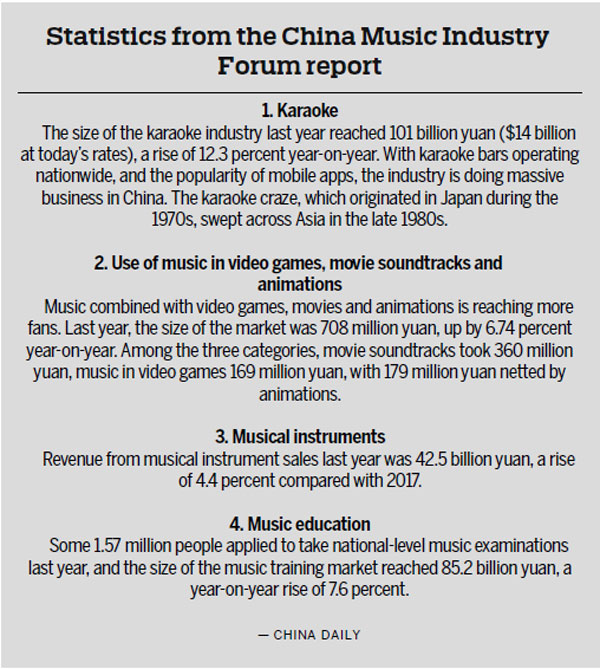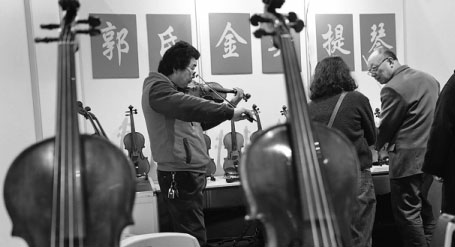Mixed notes sounded on future for music business
Promising data released; questions asked; reassurances given
The total size of China's music industry last year exceeded 370 billion yuan ($53 billion at today's rates), representing year-on-year growth of nearly 8 percent, the fastest in five years, according to a report released last week.
Figures also showed that the size of the country's music performance market last year reached 18.2 billion yuan, while that of the digital music market was 61.2 billion yuan.
The statistics were disclosed in the annual report of the China Music Industry Forum at an event in Beijing on Friday jointly organized by the State Administration of Press, Publication, Radio, Film and Television, the Communication University of China and the Music Industry Promotion Committee.
However, for some, it is debatable whether the statistics point to a brighter future for the country's music business.
Song Ke, an influential leader with decades of experience in the music industry who gave a key speech at the event, said, "It's true that China is a rapidly growing live entertainment market, but we are facing challenges, especially in the pop music industry."
Despite the figures depicting a booming music scene, it was no real surprise that the 54-year-old made such a statement.
Song, who studied science at Tsinghua University, founded the Taihe Rye Music label in 2004 and later headed Warner Music Group's operations in China.
He is now chairman of entertainment company Live Nation China, having also served in that role at online retail giant Alibaba Music. In 2012, after quitting his job as Taihe Rye Music's CEO, Song opened a Peking duck restaurant in Beijing, stirring controversy at the time with his comment, "Recorded music is dead."
Song said: "Let me ask you a question. There are two K-pop groups (from South Korea) breaking into the United States marke - BTS and Blackpink. Their albums are in the mainstream music charts and their shows have sold out fast in the US. Why isn't any pop group from China capable of achieving such commercial success?
"I have asked my colleagues from the US and they have no idea why K-pop has been so popular in the West. We had a long discussion and the answer is that we (in China) lack a good system for the pop music industry."
Song was referring to the process of producing musical content that can generate profits, and also the commercial distribution and copyright protection system and marketing strategies.
He said that compared with movies, television shows and video games, the quality of musical products has declined. The movie industry has progressed from black-and-white pictures to 3D IMAX productions, while musical platforms have progressed slowly. Listeners have no interest in paying for a song or album when there are no stringent standards to prevent music being copied and distributed illegally.
"Music is art, and art is rare and valuable. Valuable things should be paid for," he said.
In 2014, Song was appointed chairman of the nonprofit trade group the China Music Industry Committee, or CMIC, which has more than 100 members from record labels and distributors. In 2017, it launched the China Music Industry Committee Music Awards in the hope of restoring some respectability to the industry and setting standards for it, rather than the industry being "just a visual showcase".
The jury for the first awards comprised 101 members of the committee, all from record labels and distributors. Veteran songwriter and producer Jonathan Lee from Taiwan was the chief consultant.
Song said, "Few singers showed up at the gala because the results were not unveiled until later that night. People were watching and waiting to see if the awards were 'fair' and 'authoritative', as we had claimed.
"We are in the era of the hit single, as albums mean less and less to today's consumers. When you look at the statistics for digital music, it relies on stars such as Jay Chou who has a large number of followers and his musical heritage is passed on from one generation to the next. The fans have a longtime commitment," he said.
"Perhaps a greater problem lies in the quality of the music. We need more talent, such as sound engineers, producers, designers and marketing management."
Song's hesitancy in celebrating a boom for the industry probably stems from the performance of the recording business on the Chinese mainland, which struggled to survive during the 2000s after the internet took off.
In the 1990s, he witnessed a time when singers easily sold millions of cassette tapes and qualified people worked in the industry. But when large amounts of pirated music arrived on the market, few companies were serious about helping performers.
So, should the industry be worried? In a word, no.
Yang Qihu, general manager of Tencent Music Entertainment Group, or TME, said: "While people don't need music to live, they need it all the same. It's in our DNA and we're always going to consume it in one form or another. What we are seeing now is the business transforming as music streaming becomes the consumption method of choice for listeners."
Before the advent of digital music, vinyl records dominated the market from 1945 onward, and from 1980 to 2000, cassettes and compact discs were the best-sellers.
With the arrival of the internet era in the early 2000s, sales of recorded music fell, with consumers looking to digital music and subscription services. According to the report released during the forum, sales last year fell by about 2 percent year-on-year to 300 million yuan.
Yang said there were about 38 million digital music subscribers in China last year, with the proportion of users paying for services comprising just 5.3 percent of the market.
TME has the advantage of being a fully developed entertainment and content empire supported by its WeChat messaging app, video games, video streaming, a karaoke app and content-licensing deals with more than 200 international and domestic record companies.
Yang said new technologies, such as virtual reality and artificial intelligence, benefit musicians and listeners, adding that as boundaries between different industries blur, music can be sold, for example, in tandem with movies and video games.
"Music is innovation, after all," he said.
For content provider Shen Lihui, the founder of Modern Sky, one of the country's biggest independent record labels, original compositions are bringing excitement to the music scene, thanks to the emergence of online reality shows.
For example, rap has witnessed a resurgence after the first season of The Rap of China, the country's first-ever such competition, which premiered in the summer of 2017. In summer this year, The Big Band program put Chinese indie rock bands in the spotlight, raising audience figures for live shows. Both programs were produced and broadcast on the online video platform iQiyi.
Shen feels confident about the creativity of young Chinese singer-songwriters because "they are well-qualified in music production and have the potential to reach listeners abroad".
"We've signed a 19-year-old musician, who can write, produce and arrange her own music. We've also just signed a young Tibetan woman, who has been living in the United States for years and is influenced by her Tibetan roots and Western music," Shen said.
He added that both singer-songwriters are signed to his company's office in the United Kingdom, which was founded three years ago and now handles 20 bands from around the world. "Though we face lots of problems, it's comforting to think that new music is still out there."
chennan@chinadaily.com.cn


|
Performances in the open air are popular on summer nights in Xi'an, capital of Shaanxi province.Liu Xiao/xinhua |
|
Students at a primary school in Raoyang, Hebei province, play the erhu during a music course.Li Xiaoguo/xinhua |
|
A mother and her son enjoy a karaoke session in Shanghai.Wang Gang/for China Daily |
|
|
(China Daily Global 11/13/2019 page2)






















